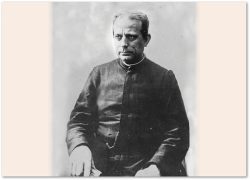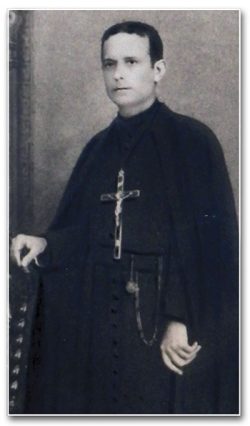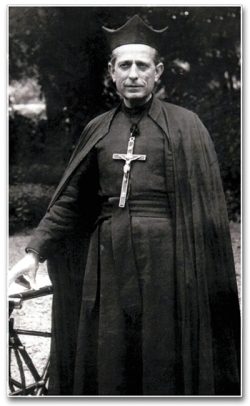Francisco de Paula Tarín was an austere and selfless priest who spent all his energies preaching the Gospel in Spanish lands. Distance, persecution, and the inconvenience of various illnesses could not stop him.

Newsroom (18/12/2024 18:31, Gaudium Press) In the first decades of the 19th century, Spain experienced a strong anti-clerical movement, which instilled in souls doubts and prejudices about the Catholic Church, if not outright and violent hatred.
At the same time, however, Providence did not fail to raise courageous pastors who would uncover the errors of the perfidious and enlighten souls about the truth. The life of the Jesuit priest Fr. Francisco de Paula Tarín is a magnificent example of this.
Origin of vocation
Francisco was born on October 7, 1847, into a strong Catholic family in the Valencian town of Godelleta, Spain. The ninth of eleven children, he was frail in health but had a jovial disposition and was always ready to serve selflessly. Endowed with privileged intelligence and an assertive personality, he soon became the leader of his companions.
At the age of eighteen, while praying at the feet of the Virgin of the Pillar in Zaragoza, he received the grace that marked him forever. Recounting it after several decades, he said, “I joined the queue, as my father wanted. When I knelt and gazed up at the holy pillar, I felt an inner warmth that has not gone away yet”. He made a good Confession, received the Holy Eucharist, and changed his life. On another occasion, he confided that this was the origin of his vocation.
He was already twenty-five when, after completing his law degree in Valencia, he decided on his future: to become a priest in the Society of Jesus. Consecrated life was a great joy for him, and he soon stood out as an exemplary religious for his extraordinary humility, piety, and charity; always fervent and punctual, he would spontaneously take on the most arduous manual work. He acquired and maintained until the end of his days the habit of sleeping only two or three hours a night, sitting in a chair, never in bed, resting his head on the backrest.
His great missionary work begins

This generosity and enthusiasm would be the norm of all his activities and the reason for the good results of his apostolic endeavors.
In 1879, he moved, by order of his superiors, from the French seminary in Poyanne to the Colegio Máximo de Oña in Burgos, where he studied theology. This small town did not enjoy a good reputation among the surrounding villages. Francisco and one of his colleagues, John Conde, turned this situation around by creating an evening academy for young men. The boys learned their first lessons on several topics, such as literature, science, and catechism. Soon, almost all the local boys attended the school. The boys thus staved off the vice of blasphemy and other bad habits; they, in turn, did the same with their families. In a few months, a large part of the population was partaking in various devotions.
He was ordained a priest in 1883 and sent to the Jesuit college in Cádiz. There, by God’s design, he received one of those blessed sources of suffering from which the success of his missions would spring: a wound on his right leg that never healed and from which he had to scrape off remnants of rotting, hideous flesh. As he once said, it was a permanent sackcloth that would cause him enormous suffering.
He then went to Talavera de la Reina, a small town in the province of Toledo, where he began his missionary incursions into the countryside. Over the next few years, he would visit more than four hundred villages in Spain, covering almost two hundred thousand kilometers in precarious means of transport.
Lenten Catechism
In his popular missions, Father Tarín practiced a new method of evangelization. It became known as the Lenten Catechism for adults. It consisted of a dialog, a sermon, and a Stations of the Cross.
In the doctrinal dialogue, two priests conversed about local issues. They discussed all the errors that needed to be corrected. Flaws seen during their days on the mission, in contact with the inhabitants of the village. Pretending to be ignorant, one priest would tell the other with his doubts and ask for explanations; the latter would clarify them based on solid arguments. The people soon nicknamed the priests Father Fool and Father Clever, respectively.
By this method, the two of them unmasked the slanders against the Church, the doctrinal errors, the gossip and rumors circulating, showing the audience what was true and false. Father Tarín always played the role of Father Bobo and knew how to perform a distinct charm. The results were so excellent that, many years later, it was still possible to see how deeply the religion had taken root in those places.
As part of his missions, he often attended Confessions until the early morning, sometimes all night, without even stopping to eat. Sometimes, he even fainted from weakness. Some said that Fr. Tarín already knew when the penitent had made his last Confession. In addition, when he attended many of those who had not been to Confession for decades, he helped them to remember their sins and never failed to add omitted offenses.
Tireless zeal for the salvation of souls
One of his companions attests: He does not stop day or night; he walks from one village to another surrounded by a troop of children, preaches several sermons a day, attends Confessions for hours on end, and, finally, spends the night kneeling at the foot of the altar […]. He celebrates Mass at the crack of dawn, and the first rays of the sun catch him on his way to the next village.
On one occasion, as he had been preaching until he got sick, his superiors ordered him to stop for a few days. But his tireless apostolic zeal led him to take advantage of this and visit a prison possessing the nickname the Hell of Cartagena. Perplexed, the prison warden wondered if the priest was mad. However, a few hours later, he and the jailers were stunned to hear the prisoners singing in unison the hymn Pardon, O my God, followed by Save me, Virgin Mary. The next day, from dawn onwards, he attended several of them in Confession. He even formed a choir for the Apostleship of Prayer. When he left, the warden advised him to be cautious. He feared the inmates would prevent him from leaving.
Recruiting in the enemy ranks
On one occasion, on the eve of the start of a mission, his opponents hired a group of young men to disrupt his evening with whistles, horns, and tin drums. Father Tarín went out to meet them and spoke to them in a fatherly manner that the boys recognized their fault and asked him to forgive them. Without wasting time, he invited them to participate in the Aurora Rosary, which would begin in a few hours. In the meantime, he took them to the local parish, where several took the opportunity to confess their sins. On that day, the Church’s enemies financed the musical accompaniment of the procession.
In Cáceres, he brought back to the fold of Christ a well-known intellectual, furiously anti-clerical, called Eduardo Sánchez Garrido. In his nocturnal gatherings, he spread rancor against priests and nuns, successfully reading the notes of an ingeniously titled book he intended to publish under the name The Devils of the Vatican. Tarín convinced him to reconcile with God, burn his notes, and put his literary skills at the service of the Church.
Persecuted by those outside and those inside
His detractors thought they could beat him with mockery, provocation, and even physical aggression, but they never managed to frighten him.
As soon as they heard that he was passing through a town, they started distributing pamphlets with caricatures, taunts, and jokes. When his enemies learned that he was going to Loja, they sent him anonymous messages with death threats. Father Tarín was never intimidated by this kind of coercion, but this time it was serious.
The mission there was ending with a multitudinous procession of the Rosary of the Dawn. Suddenly, someone unleashed a wild bull that charged at full speed. Panic ensued until the animal stopped in front of Father Tarín. He calmly approached the beast, grabbed it by the horn, and took it to a corral. He then continued the procession, to the amazement of those present.
Unfortunately, the one whom the declared enemies of the Church could not silence ended up being the victim of bad Catholics, who slandered him before the Episcopal See of Toledo. During a mission in which Fr. Tarín was preaching to the nuns of four convents, some of the Archbishop’s envoys interrupted one of his lectures, took him to the palace, and ordered him to leave the city.
Gallantry in the face of hostilities
He was also a victim of the wave of anti-clericalism and social unrest in Spain. However, thanks to his trust in the Lord, nothing frightened him. On the contrary, he gallantly defended his position as a priest of Jesus Christ. One day, he passed a tavern and noticed two men mocking him. So he went in and said to them:
It seems you wanted to attract my attention because you want to kiss the crucifix. Well, here it is.
Stunned, the two men took off their hats, kissed the crucifix, and knelt to receive a blessing.
On another occasion, he was returning at night from a mission in the suburbs of Seville. Upon arriving at the Jesuit residence in the city, he came across a mob of rioters who were roaring and smashing the windows of the building. He drove forward without hesitation. When the car stopped, someone realized there was a priest in it and started shouting:
– A priest! A priest! There’s a Jesuit in here!
Everyone crowded around the vehicle, not with good intentions. However, when they saw Father Tarín, they were silent, and one of them opened the door. They then formed a corridor to the entrance of the house. Everyone took off their hats as they passed. Once the incident was over, they left quietly.
Unassuming miracle worker
There are countless testimonies of his talents as a miracle worker.
A pilgrimage in the region of Murcia had brought together around thirty thousand pilgrims on a clear, hot summer day. Seeing that crowd so subject to the inclemency of the sun, Father Tarín began his sermon by addressing the Blessed Virgin with the following supplication: These faithful have come from afar to praise you, and they are suffering so much heat! Please, Lady, let the curtains close a little. As soon as this happened, a cloud appeared in the east, accompanied by cool air, which grew to cover the entire firmament and remained so throughout the day.
In a house, he prayed throughout the night without extinguishing the lamp. In the morning, the maid would refill it with oil and see the lamp was not empty! Furthermore, there was a jasmine-like fragrance in the room.
Once, a train of emaciated and hungry soldiers, fresh from the war in Cuba, stopped at the Utrera train station. Standing on the platform, Fr. Tarín watched as they asked for something to eat through the carriage windows. Moved, he ran to the station canteen, gathered up what little bread there was, and began distributing it evenly from wagon to wagon. Each soldier took a share , and, to the amazement of everyone, there was still bread left over! Everyone shouted, “Miracle! Miracle! Long live Father Tarín!” filled with emotion. But he had already disappeared.
The Angel of Seville

At the end of 1898, he was appointed superior of the Society of Jesus in Seville and held this position until 1904, when he fell seriously ill and moved to Madrid. During this time, he breathed new life into a decimated and aging community. While also winning the affection of the population with his continuous popular missions.
His main concern, however, was the formation of the youth. He didn’t just want the boys to attend school. Father Tarín wanted them to receive a well-chosen education and principles at school. To this end, he founded the Saint Cassian Association of Primary School Teachers, which brought together Catholic teachers who wanted to confront secular teaching that was so damaging to Christian homes.
He saw prophetically that the liberal ferment was growing in Spain and that, if it continued, it would culminate in a bloody conflict. This is what happened decades later.
Your “dark night”
Having recovered from his serious illness in the Spanish capital, he returned to the Jesuits’ residence in Seville in 1909. But the hour of his ordeal had already arrived. A new illness struck him, keeping him confined to bed until the hour of his death. He was no longer able to preach or carry out missions.
It was a cold and rainy winter’s night. Around his bed of pain, his brothers in vocation reminded him that it was the day consecrated to Our Lady of Guadalupe. The sick man commented joyfully:
– What a beautiful day to die!
Shortly afterward, he expired shouting the holiest names of Jesus, Mary and Joseph. Thus, with enviable serenity, Father Francisco de Paula Tarín Arnau, SJ, gave his soul to God on December 12, 1910.
The whole city mourned his death. Long queues formed as people waited for several hours to venerate his remains. In this way, the faithful people, who know a true shepherd, paid homage to him.
Text taken, with minor adaptations, from the Heralds of the Gospel Magazine no. 264, December 2024. By Salvador López Almán.
Compiled by Dominic Joseph



































